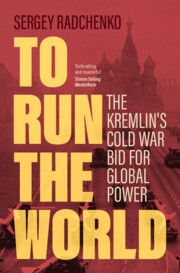Book contents
- To Run the World
- Reviews
- TO Run the World
- Copyright page
- Dedication
- Contents
- Introduction
- Part I Ambition
- Part II Hubris
- 5 Love Us as We Are
- 6 The Golden Hoop
- 7 Twin Crises
- 8 Killing Flies
- 9 The Spirit of Camp David
- 10 Berlin
- 11 Cuba
- Part III Decline
- Part IV Collapse
- Acknowledgments
- Figures
- Notes
- Bibliographical Essay
- Index
6 - The Golden Hoop
from Part II - Hubris
Published online by Cambridge University Press: 30 May 2024
- To Run the World
- Reviews
- TO Run the World
- Copyright page
- Dedication
- Contents
- Introduction
- Part I Ambition
- Part II Hubris
- 5 Love Us as We Are
- 6 The Golden Hoop
- 7 Twin Crises
- 8 Killing Flies
- 9 The Spirit of Camp David
- 10 Berlin
- 11 Cuba
- Part III Decline
- Part IV Collapse
- Acknowledgments
- Figures
- Notes
- Bibliographical Essay
- Index
Summary
De-Stalinization in the Soviet Union deepened the crisis within the international Communist movement. The exposure of Stalin's crimes led to widespread disillusionment in Communist parties in the West, while the Soviet intervention in Hungary in 1956 highlighted the moral bankruptcy of the Communist project. This chapter offers a broad overview of this difficult year, discussing why Khrushchev refrained from invading Poland and why he ordered the invasion of Hungary. It also provides new details on the joint Sino-Soviet effort to pressure North Korea's Kim Il Sung to ease brutal repressions. Lastly, the chapter argues that Mao Zedong's efforts to define Stalin's legacy contributed to his emergence as the self-proclaimed strategist for the socialist camp, bolstering China's influence.
- Type
- Chapter
- Information
- To Run the WorldThe Kremlin's Cold War Bid for Global Power, pp. 171 - 198Publisher: Cambridge University PressPrint publication year: 2024

